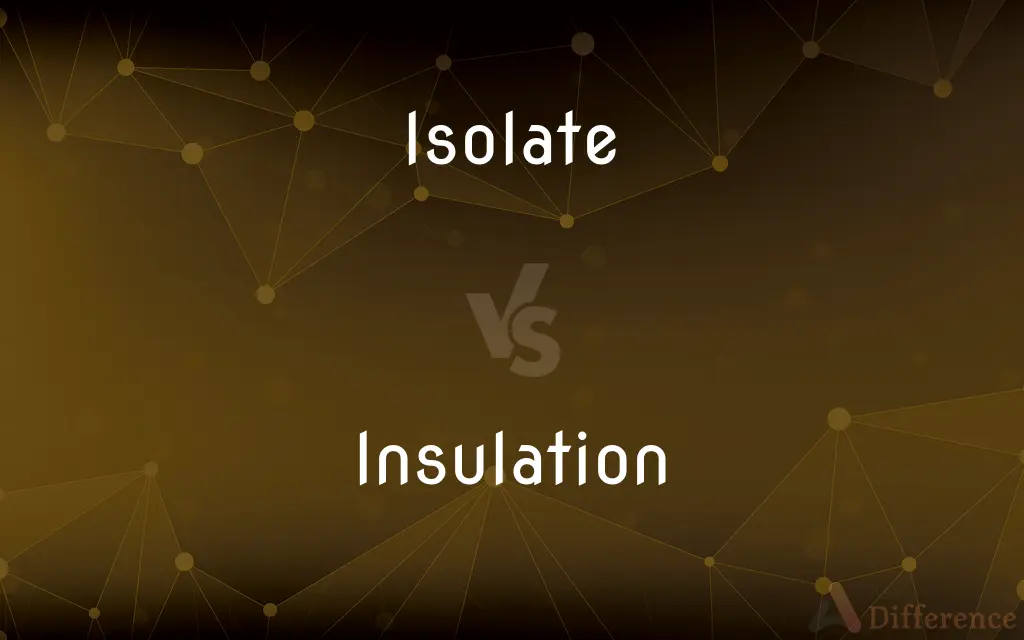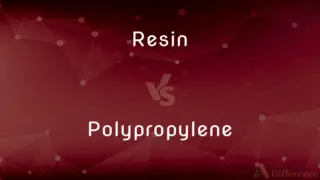Isolate vs. Insulation — What's the Difference?
Edited by Tayyaba Rehman — By Maham Liaqat — Updated on April 23, 2024
Isolate refers to the act of separating something or someone from others, whereas insulation involves using materials to prevent the transfer of heat, sound, or electricity.

Difference Between Isolate and Insulation
Table of Contents
ADVERTISEMENT
Key Differences
Isolate focuses on the action of setting apart an object, individual, or group to prevent interaction, while insulation refers to the process of creating a barrier to protect against environmental factors such as heat, cold, or noise.
Isolate can be used in both physical and social contexts, such as isolating a sick patient or a country implementing sanctions, whereas insulation is primarily a physical or technical process used in construction and engineering.
Isolate is often a temporary or strategic action taken to control a situation or study effects in a controlled environment, while insulation is usually a permanent installation aimed at improving efficiency or comfort.
Isolate can affect social dynamics or experimental outcomes by minimizing external influences, whereas insulation helps maintain desired environmental conditions, contributing to energy conservation and safety.
Isolate can be applied to abstract concepts, such as isolating variables in an experiment, contrasting with insulation, which is always a tangible, material-based application.
ADVERTISEMENT
Comparison Chart
Definition
To separate from others
To prevent transfer of energy
Usage Context
Social, medical, scientific
Construction, electrical, sound
Purpose
Control, prevention, study
Protection, efficiency, safety
Duration
Can be temporary or permanent
Generally permanent
Tangibility
Abstract or physical
Always physical
Compare with Definitions
Isolate
To set apart from others or from a main body or group.
The scientist needed to isolate the chemical compound for further study.
Insulation
A method of preventing electric current from passing between conductive parts.
Proper insulation is crucial for electrical safety.
Isolate
To single out or separate to examine or deal with.
To address the issue, they had to isolate the system's failure points.
Insulation
The act of protecting something by surrounding it with material that reduces or prevents the transmission of sound or heat.
Insulation in the walls helps reduce energy costs.
Isolate
To remain alone or apart from others by choice.
Sometimes he prefers to isolate himself to focus on his writing.
Insulation
The use of materials to prevent the leakage of energy from appliances and pipes.
Hot water pipes often require insulation to maintain water temperature.
Isolate
To reduce or cut off from external influence.
The country was isolated economically through international sanctions.
Insulation
Applying a material to reduce the exchange of sound between rooms.
Soundproof insulation was added to the studio to enhance recording quality.
Isolate
To place in quarantine or apart from contact with others.
The hospital decided to isolate patients with the contagious disease.
Insulation
Material used to insulate something, especially to prevent heat loss.
The building was wrapped in layers of insulation.
Isolate
To cause to be alone or apart, as in being inaccessible or unable to move about
The police isolated the area until more help could arrive.
Insulation
The act of insulating or the state of being insulated.
Isolate
To place in quarantine.
Insulation
A material or substance used in insulating
Soundproof cork insulation.
A layer of trapped air that serves as insulation.
Isolate
To cause to become socially or politically unengaged or ostracized
An immigrant who was isolated by his poor language skills.
Insulation
The act of insulating; detachment from other objects; isolation.
Isolate
To render free of external influence; insulate
A system of government that isolated its citizens from foreign ideas.
Insulation
The state of being insulated; detachment from other objects; isolation.
Isolate
To identify or distinguish as a separate entity or group
The study tried to isolate the effects of changing schools on student performance.
Insulation
Any of a variety of materials designed to reduce the flow of heat, either from or into a building.
Isolate
(Chemistry) To separate (a substance) in pure form from a combined mixture.
Insulation
(engineering) The act of separating a body from others by nonconductors, so as to prevent the transfer of electricity, heat, or sound
Isolate
(Microbiology) To separate (a pure strain of a microorganism or virus) from a mixed culture.
Insulation
(engineering) The state of a body so separated.
Isolate
(Psychology) To separate (experiences or memories) from the emotions relating to them.
Insulation
(electricity) a medium in which it is possible to maintain an electrical field with little supply of energy from additional sources.
Isolate
To set apart (a component, circuit, or system) from a source of electricity.
Insulation
The act of insulating, or the state of being insulated; detachment from other objects; isolation.
Isolate
To insulate or shield.
Insulation
The act of separating a body from others by nonconductors, so as to prevent the transfer of electricity or of heat; also, the state of a body so separated.
Isolate
Separated from others
An isolate population.
Insulation
The material or substance used to insulate from either electrical or thermal conduction; as, fiberglass is used as thermal insulation in the walls and roofs of houses.
Isolate
A person, thing, or group that has been isolated, as by geographic, ecologic, or social barriers.
Insulation
The state of being isolated or detached;
The insulation of England was preserved by the English Channel
Isolate
(Microbiology) A population of microorganisms or viruses that has been isolated.
Insulation
A material that reduces or prevents the transmission of heat or sound or electricity
Isolate
(Linguistics) A language isolate.
Insulation
The act of protecting something by surrounding it with material that reduces or prevents the transmission of sound or heat or electricity
Isolate
(transitive) To set apart or cut off from others.
Isolate
(transitive) To place in quarantine or isolation.
Isolate
To separate a substance in pure form from a mixture.
Isolate
(transitive) To insulate, or make free of external influence.
Isolate
To separate a pure strain of bacteria etc. from a mixed culture.
Isolate
(transitive) To insulate an electrical component from a source of electricity.
Isolate
(intransitive) To self-isolate.
Isolate
Something that has been isolated.
Isolate
To place in a detached situation; to place by itself or alone; to insulate; to separate from others; as, to isolate an infected person from others; to isolate the troublemakers in a classroom.
Short isolated sentences were the mode in which ancient wisdom delighted to convey its precepts.
Isolate
To insulate. See Insulate.
Isolate
To separate from all foreign substances; to make pure; to obtain in a free state; as, to isolate the desired product from a reaction mixture.
Isolate
To obtain a culture of a microorganism in pure form (from a complex mixture); as, to isolate Eschericia coli from a patient's blood.
Isolate
Something that has been isolated; as, an isolate of a powerful antibiotic from a tropical plant; an isolate of tuberculosis bacillus from an infected patient.
Isolate
Place or set apart;
They isolated the political prisoners from the other inmates
Isolate
Obtain in pure form;
The chemist managed to isolate the compound
Isolate
Set apart from others;
The dentist sequesters the tooth he is working on
Isolate
Separate (experiences) fromt he emotions relating to them
Common Curiosities
Why is insulation important in buildings?
Insulation is crucial in buildings for enhancing energy efficiency, maintaining temperature control, and reducing noise pollution.
What is the primary goal of isolation?
The primary goal of isolation is to separate and prevent interaction or influence, enhancing control over a situation or environment.
How does isolation affect an experiment?
Isolation in experiments helps in controlling variables, ensuring that results are attributable to the factor being tested.
Can isolation be both physical and psychological?
Yes, isolation can be both physical, as in separating individuals from others, and psychological, impacting mental states.
What are the risks of social isolation?
Social isolation can lead to significant psychological effects, including depression and anxiety.
How does thermal insulation work?
Thermal insulation works by using materials that have low thermal conductivity to reduce heat flow.
Can isolation be used as a strategy in international relations?
Yes, isolation can be a diplomatic strategy, often in the form of sanctions or diplomatic distancing.
How does electrical insulation enhance safety?
Electrical insulation prevents accidental contact with conductive parts, enhancing safety by preventing shocks.
What materials are commonly used for insulation?
Common materials for insulation include fiberglass, foam, and reflective foils.
Is insulation always beneficial?
While generally beneficial for energy conservation and safety, improper insulation can lead to issues like mold growth or inadequate ventilation.
How long does building insulation last?
Building insulation can last 20 to 100 years, depending on the material and environmental conditions.
What are some alternatives to traditional insulation materials?
Alternatives include natural fibers like wool, recycled materials, and innovative aerogels for higher efficiency.
What is the effect of isolation on microbial growth in labs?
Isolation is crucial in microbial labs to prevent cross-contamination and ensure accurate study of specific strains.
What is the difference between soundproofing and insulation?
Soundproofing specifically refers to blocking sound transmission, while insulation might also involve preventing heat transfer.
Are there ecological impacts of insulation materials?
Some insulation materials can have ecological impacts, including issues of sustainability and toxicity.
Share Your Discovery

Previous Comparison
Correct vs. Right
Next Comparison
Resin vs. PolypropyleneAuthor Spotlight
Written by
Maham LiaqatEdited by
Tayyaba RehmanTayyaba Rehman is a distinguished writer, currently serving as a primary contributor to askdifference.com. As a researcher in semantics and etymology, Tayyaba's passion for the complexity of languages and their distinctions has found a perfect home on the platform. Tayyaba delves into the intricacies of language, distinguishing between commonly confused words and phrases, thereby providing clarity for readers worldwide.














































